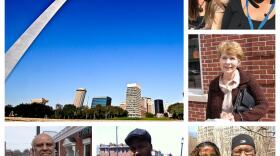
Emanuele Berry
Former We Live Here Host and ProducerEmanuele Berry is a 2012 graduate of Michigan State University. Prior to coming to St. Louis she worked as a talk show producer at WKAR Public Radio in Michigan. Emanuele also interned at National Public Radio, where she worked at the Arts and Information Desk. Her work has been recognized by the Michigan Association of Broadcasters, the Society of Professional Journalists, the Radio Television Digital News Association and the Hearst Journalism Awards Program. Berry worked with St. Louis Public Radio from 2014 to 2015.
-
This week's We Live Here podcast is something a little different.Recently, we've been looking at health and the way that toxic stress can impact someone's ability to succeed and even to be healthy. We'll be transitioning to a new area soon, but we wanted to take a step back this week to allow Emanuele Berry to produce her own, unique show.
-
A single school can tell us a lot about the health of the community in which it exists. It can also tell us a lot about how systemic problems with transportation, food, housing and crime adversely impact impoverished communities and the health of the people who live there.
-
Given that treating people is already a challenging task, imagine the extra challenge that comes from treating people who experience toxic stress — the stress that comes from constant exposure to poor housing conditions, lack of quality food or exposure to violence.
-
While most people think of the "Delmar Divide," as simply a line that separates a mostly white community to the south and a mostly black community to the north, the reality is that the divide represents huge disparities in health.
-
A sliver of the 1.5 million people in federal and state prisons will remain in prison for life. But the vast majority are released at some point. How does someone adjust to life outside after spending years behind bars?
-
Even pleading guilty to a misdemeanor can come with some other penalties. These are called collateral consequences, and they're the focus of this episode of We Live Here.
-
In this episode of We Live Here, we explore the price and perils of our public defender system.
-
On this episode of We Live Here we introduce you to four police officers who discuss not only what life is like during the day-to-day grind of work, but also the question of whether or not race makes a difference for African-American officers in majority white police departments.
-
We Live Here spent the last several weeks ramping up to explore race in St. Louis and, specifically, how systems intersect with people to create a lot of the inequality in our region ... and around the country. Now, we are moving from the general to the specific. We will spend the next several months exploring the criminal justice system.
-
This episode of We Live Here is all about talking about race without actually talking about race.
-
Now that we've looked at the jigsaw puzzle of St. Louis County, we consider the children. In a place where people from different backgrounds — and especially different races — seldom live next to each other, we ask the question: What does that mean for kids?
-
Within St. Louis' system of municipalities, people are largely divided — white, black, rich and poor. They rarely live next to each other.












